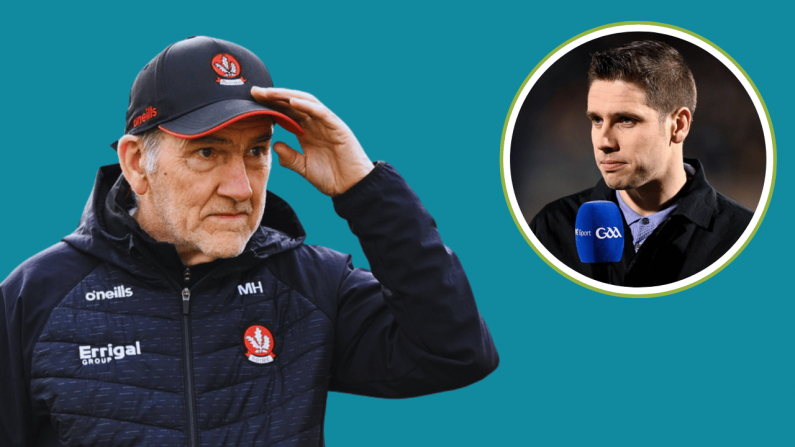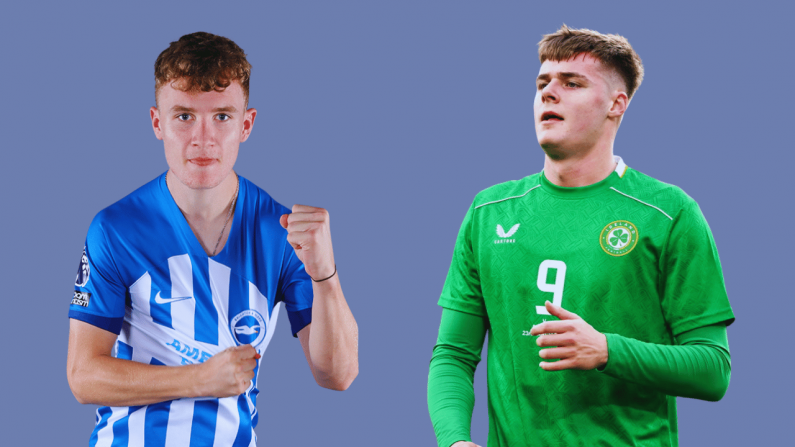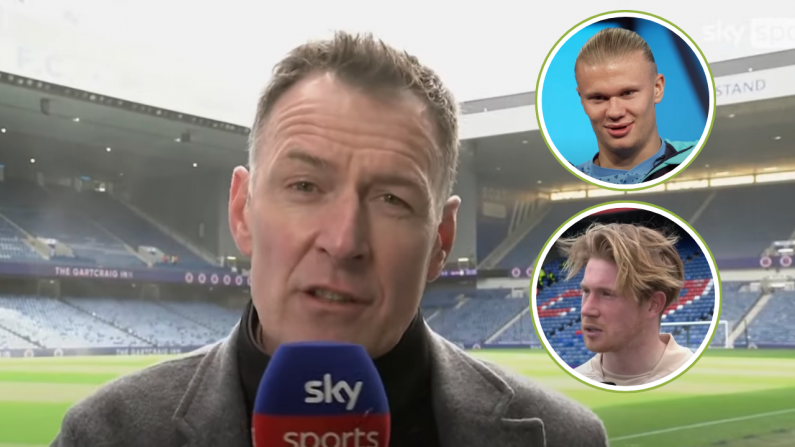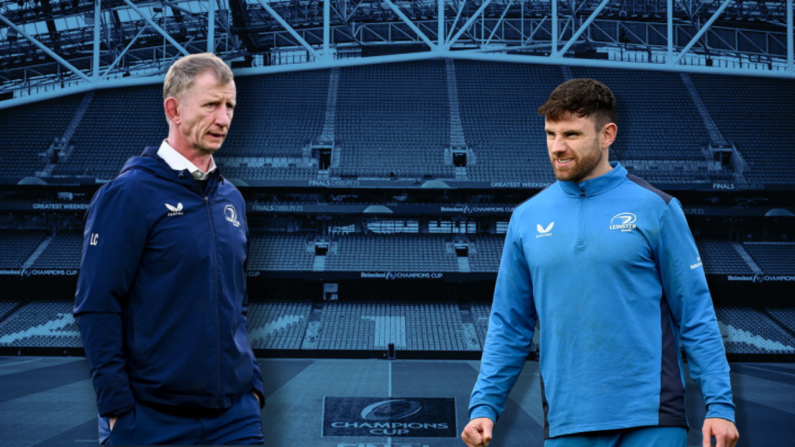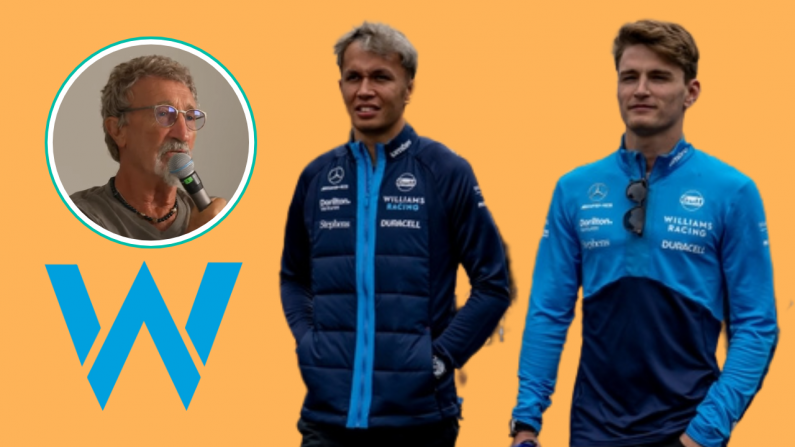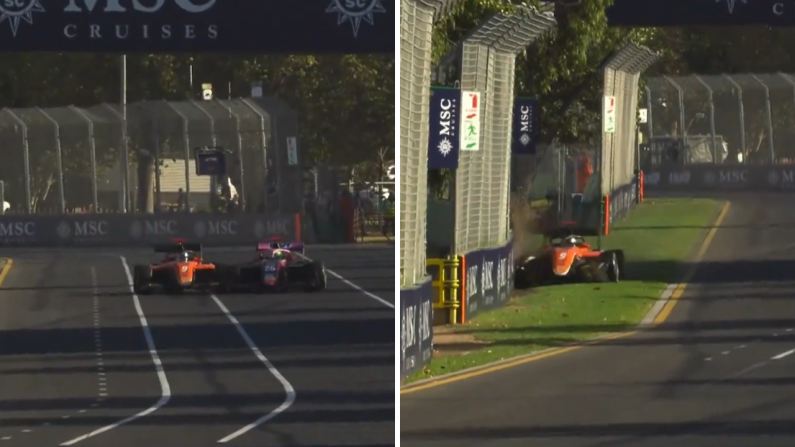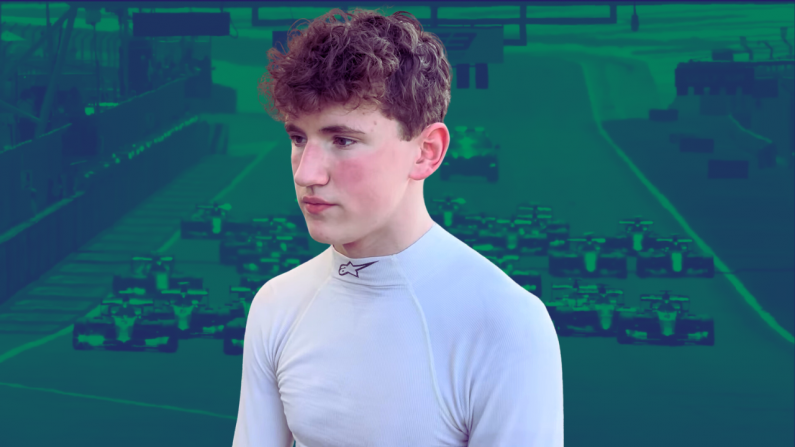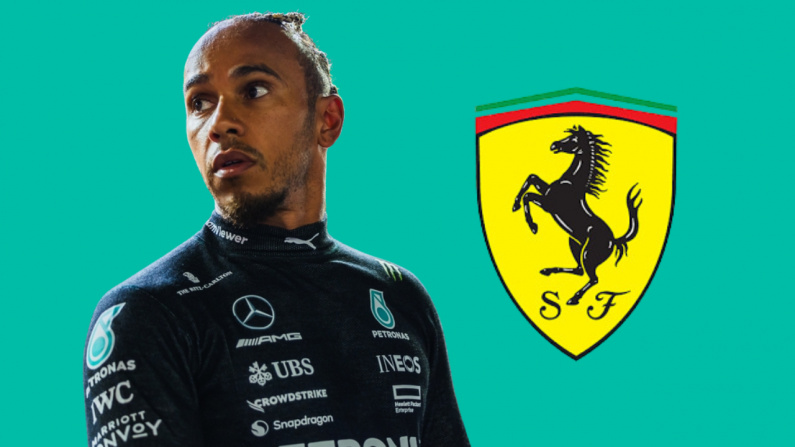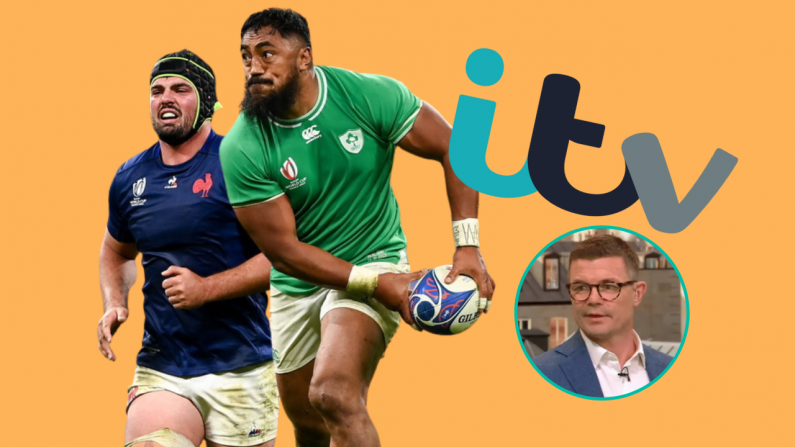When did you know it was over?
Mexico, 1994. When I was being shot at.
- Tommy Byrne
If Ayrton Senna was quicker than God, then Tommy Byrne was just too damn fast for Him.
Both were set to be the latest transcendent sporting rivalry in the late 1970s.
Yet in 1994, one died young; a tragedy amplified by devotion. The other cheated death as a nobody.
For Tommy Byrne is the greatest Irish sportsman that never was. It took six years for Byrne to go from Mondello to McLaren, in six years he cut an acerbic path through the antiseptic world of professional motor-racing. But that meteoric rise curdled with callous circularity: when Tommy Byrne found that he and Formula 1 just didn't match, the fall was equally fast.
The fall is complex and is told in a masterful documentary, Crash & Burn. I met Byrne this week, ahead of its release, to wonder how the man who created storms to which he could feed caution ended up writing a cautionary tale.
What happens when talent isn't enough? What happens when your face just doesn't fit? What happens when you don't allow it to?
Tommy Byrne found the game was rigged. The only way to win was to stop playing.
*****
The Rise
Forget Schuey and Senna. Tommy Byrne was the best of them all.
- Eddie Jordan
In 1978, Byrne was racing stock cars at Mondello Park. Six years later, he was clambering into a McLaren F1 car - the fastest around - with two British Formula Ford 1600 titles, British and European titles at Ford 2000 level, and a British Formula 3 championship under his belt.
Not that it was easy. Whereas his competition at F-Ford and F3 (the League One and Championship respectively to F1's Premier League) were largely young drivers with wealthy backgrounds, Byrne had to make most of his money from racing. He fought the silver spoon with speed.
The speed came from bravery; the bravery from confidence. The confidence didn't always stay at that. Some will say it strayed too far past cockiness.
Gavin Cooney (GC): In the movie, you say over a scene that shows you striding through the paddock: "As a young driver, you can't show weakness. Otherwise, you're fucked. If Tommy Byrne is coming behind you, you'd better pull over". Was your attitude off the track the same as on it?
Tommy Byrne (TB): I wasn't even thinking about what people were thinking, but I did know that as far as your driving, you had to be the boss, and you had to show people you're the boss. Sometimes you have to crash a bit. If somebody is trying to pass you, maybe you are better both going off.
That happened a few times, and the same thing happened with Senna. You have to show them that 'I'm the man, and don't try to pass me, or there'll be trouble'. That's the reputation you needed to precede you, and then you better win. You better back it up.
But walking through the paddock, I was all over the place. I probably had a bit of ADD. And if someone asked me a question, I'd just go dum and answer it. I did walk fast. I ran all over the place, and I had a lot of fun. I was cracking jokes all the time. Maybe, when I got into the car, I was just stupid and funny. I wasn't getting into the car and praying to the Lord of having a good race.
People have different ways of doing things. People perceive me as not taking it serious, but I was taking it very seriously. I hated when people talked bad of me and when the press talked bad. That was just me, I couldn't stop myself.
GC: You were affected by negative press?
TB: Absolutely. Who isn't? That's the chip on your shoulder, negative press. Yeah, sure it affected me.
GC: At what stage?
TB: Oh, all the way.
GC: Even at Mondello?
TB: Oh yeah, absolutely. All the way up.
GC: How were you perceived at Mondello? I can understand if it was slightly different in England.
TB: Now, I don't know how it comes across in the movie, but I was liked by 95% of people. I didn't get to where I got by being a bollocks. I got to where I got because I was a good driver and got a lot of backing and they all liked me. Everybody loves a winner, and if it does come across that I'm a bit of an asshole... I wasn't.
I had a lot of friends, and I partied with a lot of people. It wasn't just to get where I was going, I enjoyed it, and I had a lot of fun.
I just knew I was a good driver.
GC: Where does that self-confidence come from?
TB: I don't know.
GC: It's not a very Irish thing.
TB: It's ridiculous. It's ridiculous that where I came from, [a family] with six kids, that I would think I'm the best driver in the world. I have absolutely no idea. But when people asked me 'Tom, are you the best driver in the world? I'd say sure'. What else would you say?
What would Ron Dennis [Team Principal at McLaren] say if he asked you if you think you'd win all these races'? 'Erm I'm not too sure Ron, maybe'. You're screwed if you do and you're screwed if you don't.
If you ask Senna 'Can you win all these races?' He would just sneer and walk away. You don't ask stupid questions.
Every time I drove, I had to win.
GC: What was that like?
TB: It was hard. The Formula 3 stuff... the team had no money. We needed prize money to survive week-to-week. It was pressure, it was definitely pressure. To be able to stay in front of someone, when they are up your ass, two feet away, for a whole race?
That's pressure. To not make a mistake? That's pressure.
But I got pretty good at it.
*****
The Rival
You fucking Irish thief!
- Ayrton Senna to Tommy Byrne, 1982
The name of Ayrton Senna forever lurks in the hinterland of Byrne's story. Their fleeting convergence is epochal; their rivalry defined by familiar differences.
They were the twin prodigies of motor racing in the late 1970s and early 1980s. Months after moving over from Ireland, Byrne earned a free ride - by which is meant he did not have to pay for the privilege to race - at Formula Ford with the highly-competitive Van Diemen team.
Senna joined the team later, but was always a year and engine class behind Byrne, meaning they never actually raced each other. Not that this hindered ill-feeling.
While Byrne raced for free, Senna grew frustrated. He came from a wealthy family in Brazil and was paying between £20,000 and £30,000 in order to race.
This eventually caused Senna to quit the sport in 1981, on the eve of the Formula Ford Festival. Seeking victory, Van Diemen turned to Byrne. He won, of course, in Senna's car. The victory gave Byrne the chance to step up to Formula 3. He took Senna's chance in Senna's car.
Unexpectedly, Senna returned to England the following year, finding the road car given to him by Van Diemen was still at the team's HQ in Norfolk. He also noticed that Byrne had swapped a flat tyre on his own car for an inflated wheel on Senna's. The Brazilian flew into the garage in a rage, grabbed Byrne, roaring 'you fucking Irish thief'. They nearly came to blows.
It is a rivalry of deep irony: Byrne believed money allowed Senna more control over his own destiny; Senna grew angry because the money he had did not seem to guarantee it.
GC: Let's talk about Senna. Was your relationship initially quite good?
TB: It was like two boxers, walking around eachother. They're looking at eachother, both knowing how good each other are. Sure I knew he was good, and he knew I was good. But he knew I could beat him, and I knew he could beat me. But we never got to race against each other.
He was the one who got upset with me.
GC: You weren't bitter with Senna getting into this sport with a silver spoon?
TB: No.
GC: It was more the silver spoon being annoyed at you getting a ride for free?
TB: Yes. But not just that. I did win that big race in his car, and I think that's where it went. Senna was just unhappy. We had dinner together, we lived in the same place, but we were just wary of each other. He wasn't a partier, and I was. I enjoyed a drink, and he drank once a year.
There was no problem until he came back to see that I had switched the wheels on his car - which wasnt really his car because he wasn't coming back - and we were going to sell it to another driver because Senna never paid for it. He was the one who lost his mind when he saw the tyres.
He was probably angry that I drove his car and won the Formula Ford festival, and got a Formula 3 ride as a result.
GC: Your relationship improved?
TB: We did make up.
GC: Do you remember where you were when he died?
TB: I was in Mexico.
GC: Do you remember what you felt when you heard the news?
TB: At the time, I felt nothing. But I wasn't jumping up and down excited because he was dead, for sure. It was years later when I watched the Senna movie that I kind of felt very sad, because he had started to become very nice and very friendly and just... happy.
Because he wasn't happy, even when he was winning all those championships. And then a year before that, he started to get happy.
And then he died.
*****
The Rejection
- I'm sorry, Tommy, but our money is tied up in R&D at the moment.
- What's R&D?
- A conversation between Ron Dennis and Tommy Byrne, 1982.
Byrne made the step up to Formula 3, and looking back was restricted solely to his rear view mirror during races. He raced for Murray Taylor Racing on a shoestring: the team relied on Byrne's prize money to survive from one week to the next. The pursuit of money and some useful networking brought Byrne and his team to McLaren and Ron Dennis, whom they asked to underwrite costs for the rest of the year.
That led to the conversation above, which Byrne believes left him looking "uneducated and cocky" in the eyes of Dennis. In other words: incompatible.
Nonetheless, Byrne kept winning at Formula 3. His form could not be ignored, and he eventually got a race at Formula 1 with Theodore. The issue: their budget was tiny, and as a result, their car couldn't lift Byrne into being competitive. He soon grew frustrated by the unfamiliarity of defeat and the fact that the team found fault with his driving, rather than the car. A falling out meant Byrne lasted just five races with Theodore, before returning to Formula 3. It ended in a row in Las Vegas, with Byrne throwing a chair at the team's engineer.
Despite having missed a few races, Byrne was still in contention for the British F3 title, with the prize being a test in a McLaren F1 car. Byrne dropped down to F3 to earn the shot at being catapulted to the top of the F1 grid a year later.
He upheld his end of the bargain, and earned the McLaren test drive. On that afternoon, he delivered once again: lapping faster than Niki Lauda. With a Championship-winning time in the bag, a phone call and a contract from Ron Dennis seemed a matter of time.
Neither ever came. Instead, 20 years later, came a revelation.
GC: You get five races with Theodore. And the car is basically crap.
TB: Everybody knew that. They had no money. They had a $500,000 budget, versus 20 million at the time. I just didn't have the patience to be screwing round. I knew my life was going downhill, because I wasn't winning. Once you get into a bad car in Formula 1, that's basically it.
[When he suggested improvements to Theodore] They just laughed at me. I wasn't used to that, I had just won five championships with people who respected me. Then, I found out eight years ago, when Mark Hughes wrote the book [his autobiography], that they never even wanted me. Sydney Taylor - a partner in the company, an Irish guy - wanted me in the team. Nobody else did. They had to sack their best driver to get me in. So they're not going to listen to me.
GC: You'd been winning for three years. How do you then deal with that?
TB: Devastating. Maybe if I had been nice to them...but I just couldn't be nice. I couldn't. The guy [Theodore's team engineer] is fucking up my life. I couldn't understand why they couldn't qualify the car. Why they wouldn't want to listen and move forward like I did with every other team.
Let's at least qualify, let's at least get the thing up closer to the front. One time I was 14th quickest - unheard of with that car - and something happened, I heard a little pop with the engine at the end. Then I went to 14th quickest to last. I lost a full second.
In those days, four cars went home without qualifying. So here I am, nearly last. I mentioned that there was a little pop to the chief engineer, and their answer was to bring Jackie Stewart over to tell me how to drive. Can you just imagine what I said?
I listened to Jackie as politely as I could, looking him in the eyes when he was telling me to take a certian line...If you went up to Senna, and told him how to drive...It wouldn't have been a good outcome.
GC: How was the meeting with Jackie Stewart?
TB: I just looked at him. He said 'Tommy, you need to be taking this corner over here' and I said 'Well, did you see me earlier on? I was 14th quickest'. You don't take wrong lines after winning six chamionships to get into Formula 1, it's just ridiculous. But that was their answer, rather than thinking there was something wrong. Ralph Furman or the F3 guys would have known 'Wait, there's something wrong here. Tommy doesn't just lose a second in just one session'.
I didn't go off on Jackie Stewart, but I did go off on the Team Manager, who was Joe Ramirez. I said 'Don't you ever bring anyone over and tell me how to drive'. Turns out Joe Ramirez was in F1 for 20 years at that stage. He knew everybody...Ron Dennis, everybody.
Later on, that test with McLaren probably didn't help. I was young, I didn't know that everybody knew everybody. That's the time I probably shouldn't have shouted at Joe Ramirez. He's actually a nice guy.
GC: When did you find out the McLaren car had been tampered with?
TB: 20 years after.
GC: How did you find out?
TB: I was walking a pit lane in America, and I met the mechanic who was the mechanic on the car that day. He said, 'Tommy, how is it going, haven't seen you for almost 20 years'. I said 'I'm fine' and this, that or the other. At this stage I was doing good.
He said 'Yeah, you were so fast, Godammit, that day we all talked about how fast you were, and can you imagine if you had the best car? You didn't even have the best car'.
He said after he [the previous driver] got out and before you got in, 'We were told not not give you the full gas'.
GC: Was that an order from on high?
TB: It didn't come from Ron Dennis, actually, because he wasn't there that day. Maybe Ron had said 'Make sure this guy doesn't go quicker'. Because I had told everybody 'Come and just watch me drive that McLaren, and you'll fucking see whether I can drive or not'. I just couldn't help myself.
But that was how confident I was. I was probably mouthing off a little too much and they decided 'Let's fucking screw him over, let's make sure he's not quick'. And that's what they did. And they gave me the wrong times. I didn't find that out until later, too.
GC: They gave you a false time? [McLaren told him he raced a 1.10].
TB: Yeah. Because Joey Greenan, who was there timing - the Irish driver that actually led Senna - told me 'Oh Tommy, you did a 1.09.16, and I said 'Yeah right, whatever'. I didn't believe him, I believed McLaren. But now, putting two and two together...
GC: There seems to be a misinformation about what happened after. I've read reports that you got out of the car and told Ron Dennis 'This is a shit car'.
TB: That didn't happen. Firstly, Ron wasn't there. I already knew that I wasn't driving for Ron Dennis, he had told me two months before there was no drive available. No I didn't. One of the Irish guys spread that around, and he can kiss my ass. That really pisses me off to this day, that was the one time I kept my mouth shut.
That's one of the reasons I wrote the book. People make shit up, and it goes on and on and on.
GC: Where does the Ron Dennis dislike of you come from?
TB: I had a contract with McLaren. That R&D story: I still signed a contract with him, and he had the option of my services. But when I wanted to race with Theodore, I had to go back to him and ask him could I get out of that, and he said no, we advise you to only sing a one year deal [with Theodore].
So I went back to Ron again and asked 'Do you have anything for me', and he said no. I asked him 'Do you have anything in the near future? And he said no. I knew there was nothing coming.
So who did it, or why they did it... but it's kind of cool that they had to slow me down.
It means I was scaring somebody.
*****
The Realisation
Did he really want to succeed at Formula 1? Sometimes, you just have to play the game.
- Eddie Jordan
After the rejection at McLaren, Byrne went back to Theodore, but they demanded £1 million in return. Byrne's F1 career had run out of road. He moved to America, competing in the American Racing Series - the rung below IndyCar series - while starting a family. This provided happiness for a few years, but as his Byrne's competitiveness faded, money grew tight and tension seeped into family life.
Byrne took a job racing in Mexico in 1991, with a team backed by a wealthy Mexican named Orchio, whom he describes in his book as a "rich playboy alcoholic manic-depressive bisexual". Racing for a team sponsored by Corona meant a plentiful supply of beer, and Byrne's time in Mexico became a kind of drug and alcohol-fuelled descent to a heart of darkness. And like everything else in his life, it happened quickly.
He realised that he had to get out of Mexico in 1994, when he heard gunshots upstairs at a house party. He ran into the hallway to see what had happened. He saw naked women fleeing from an upstairs room, with a naked Orchio striding out, holding a gun. The shots followed soon after.
GC: I want to ask you about the Eddie Jordan quote wondering if you really wanted to succeed at Formula 1, and why you wouldn't play the game.
TB: I played the game as long as I could. I played the game well enough to win six championships and get to Formula 1, and be the fastest McLaren driver at that time, for that brief period. I just...Y'know, you just work so hard at it, you just get tired of it. After that, I was tired. I came back and tried to play the game, and I went to see Theodore to get a drive, and they wanted £1 million. So that meant no more playing the game.
Look, if my aunt had balls she'd be my uncle. There are plenty of ways of looking back and saying I should have done this or that...But I still say, show me a fast driver and then we'll work out how to play the game.
I always wanted to go to America, I watched John Wayne movies at Christmas. I didn't leave Dundalk because I hated the people or hated the town, I left because it was cold and damp all the time.
You're always hanging in there for that million dollar deal because, hey, it's an easy way to make money. After a while, you say you'll do just one more year - just one more year - and say to yourself 'I've still got the chance, I've still got the talent'. I should have got a job teaching or instructing ten years earlier...I wasted ten years.
GC: What was the moment you realised it was over?
TB: Mexcio, 1994, when I was being shot at. When the shot went over my head. He was a very bad shot. We went shooting before, so I knew about his shooting abilities. They weren't very good. And we were all fucked.
GC: Do you want to talk about Mexico?
TB: It was partying, just too much partying. Just a lot of partying, and this guy was nuts. Maybe not a narco, but he was just a manic depressive and you didn't know what he was going to do next. And he liked me a lot. Way too much. He was on me one day, trying to fuck me from behind. There were a bunch of whores in there, and he was on me from behind, trying to get on me. I don't do that. So I'd feel something on my back, and say 'Hey, get off', swatting him off. I'd swat him off, laughing, thinking 'Jesus Christ, if my friends could see me now'.
I was trying to swat him off and I'd look over and see his bodyguard in the corner who always had a gun, and he was just looking at me, and then I began to get a little bit scared thinking 'Shit, I hope I'm not going to get butt-fucked here'. But I got him off, but it was just crazy.
He would give my team money. He thinks I saved his life because I sold him a helmet. I sold him a helmet for three times what it was worth the first time I ever met him and he thinks it saved his life. So if I ever needed something for the team, I'd just mention it to him and he'd buy it.
He thought he was a driver. He tried to get sponsorship for both of us. He was a horrible driver, he never drove that much. Once in a Formula 3 car. He was worth lots, he was a trust fund baby. It's just very sad...I mean I liked him. Again, I liked all these people. Then you'd meet them and it turns out that they are wackos.
******
The Retelling
The name of the movie should be I'm Happy Now.
- Tommy Byrne
The movie necessitates a lot of looking back. How do you come to terms with such extravagantly unfulfilled potential?
GC: When you were in Mexico, were you bitter about how things turned out?
TB: Yeah, every race car driver thinks they should have been in there, where the other guy is. [I] Probably [experienced] five years of it, I went through that, after F1. Just getting too drunk and saying 'Fuck, I could have been there' but I got over it. Then I got a real job, and that's it. I still get up to watch F1 every weekend to see if it's got any better, and anyone that makes money out of racing, I say good luck to them.
I have no....I'm over it. I've been over it for 20 years now.
GC: How has the process of making the movie impacted on that?
TB: The movie brings it all back, but I've been fine.
I've been moved on for a long time, making the movie, they [the film's director and producers] kept trying to bring me back.
I remember screaming at the director Sean in a London pub 'I'm fucking happy now! Everyone froze for a second and then we all started to laugh. The name of the movie should be I'm Happy Now. I've been happy for a long time.
GC: You weren't great at taking direction as a driver. How did you find taking orders from a director?
TB: They kept trying to make me cry.
GC: Oh really? Do they explicitly ask you to?
TB: No.
GC: They were just prodding you in that direction?
TB: There was a lot of prodding, yeah. Same questions in different places. Especially at my old house. They wanted me to go into the house. 'I'm not going in there'.
GC: What was it like taking orders from a director?
TB: You mean learning how to stand like a Kerryman or a Corkman?
GC: How does one stand like a Kerryman or a Corkman?
TB: Stand up against a wall like this [stands up, and with left hand outstrethed, he hunches forward as if leaning against a wall] and look into the distance for about 45 minutes without smiling. It was hard, I was asking' Why do I have to stand like they stand?'
I had to hold onto a fence. There's a certain way of holding onto fences. That's not the way I hold onto fences; I don't even hold onto fences! Why are you making me hold onto a fence when I don't hold onto fences? But then suddenly, later on, somebody did something, and there I am, holding onto a fence!
*****
The Reflection
GC: Would you encourage your sons to go into racing?
TB: It's up to them. But competitive racing? No. I tell them to race for fun. That's what I do now.
GC: Why?
TB: Racing... It's a road to nowhere.
Crash & Burn is in cinemas from December 2.


